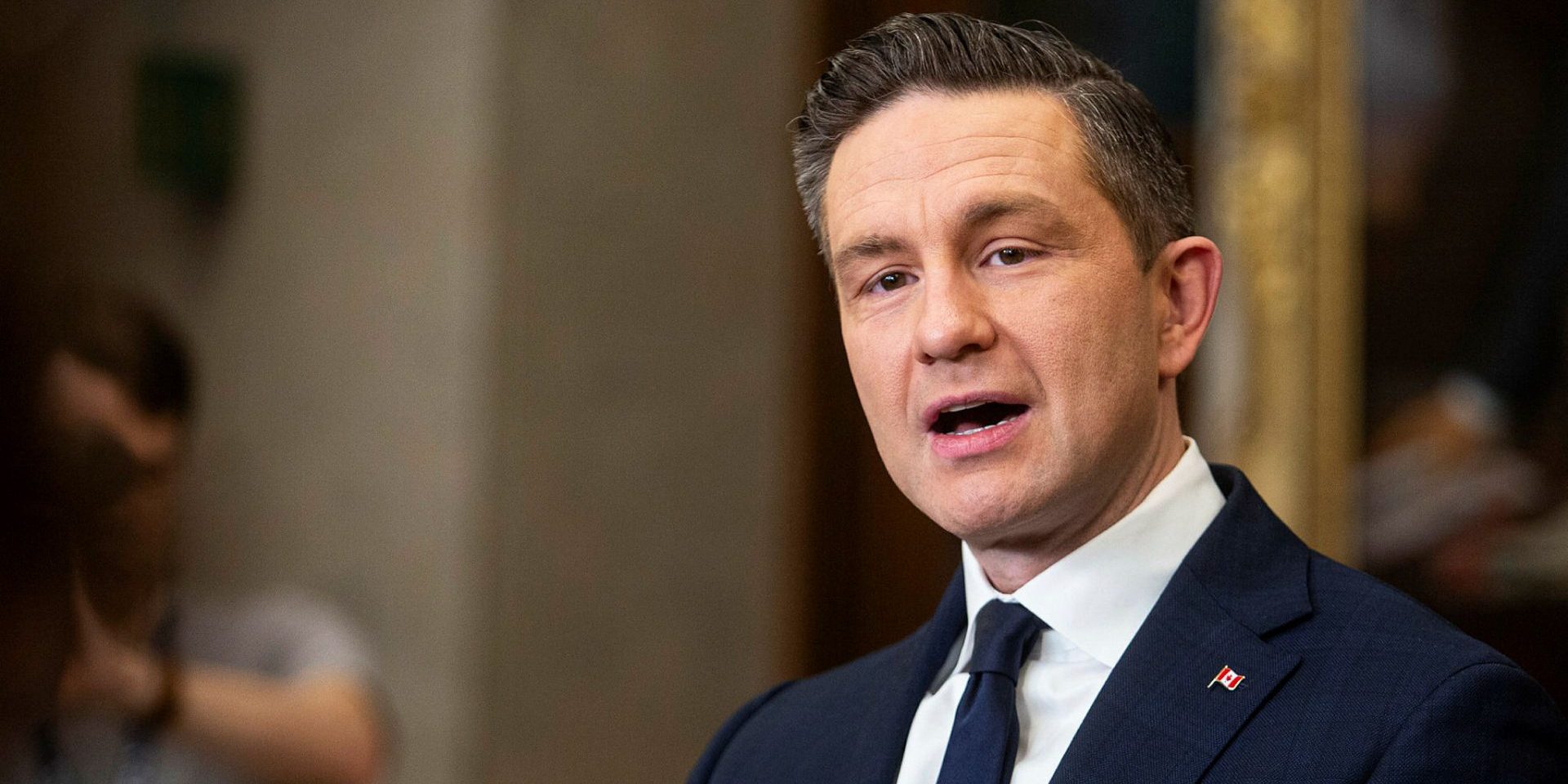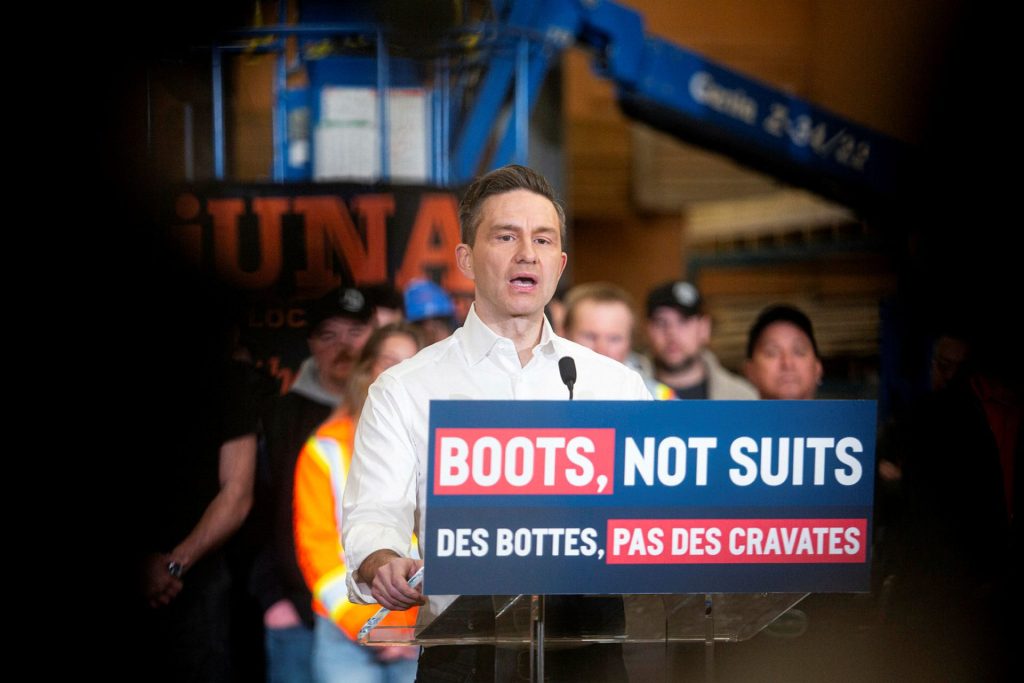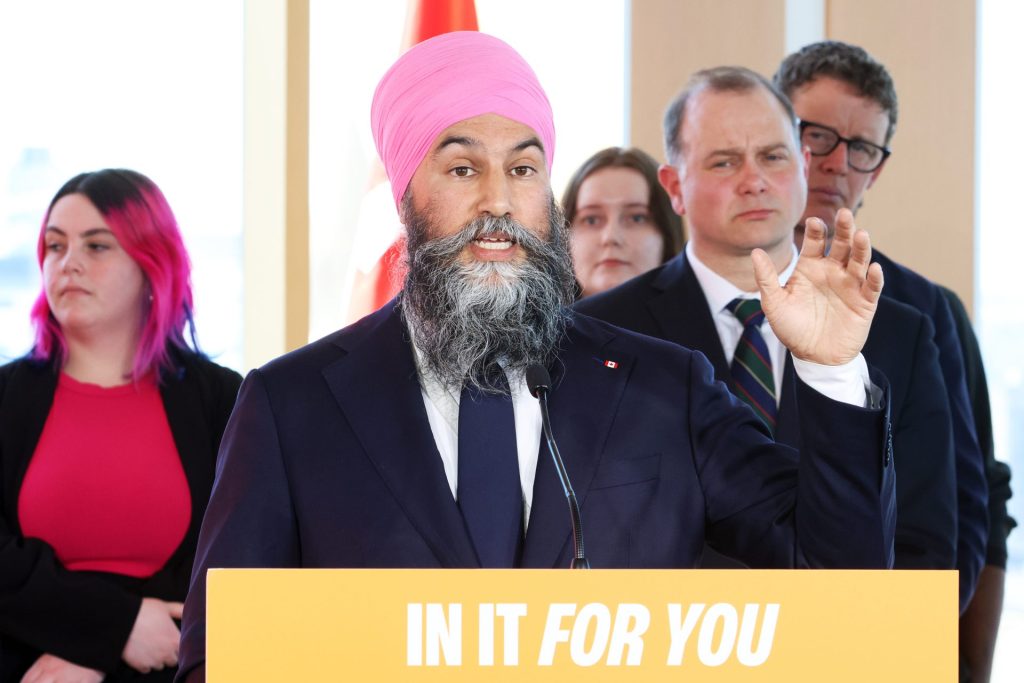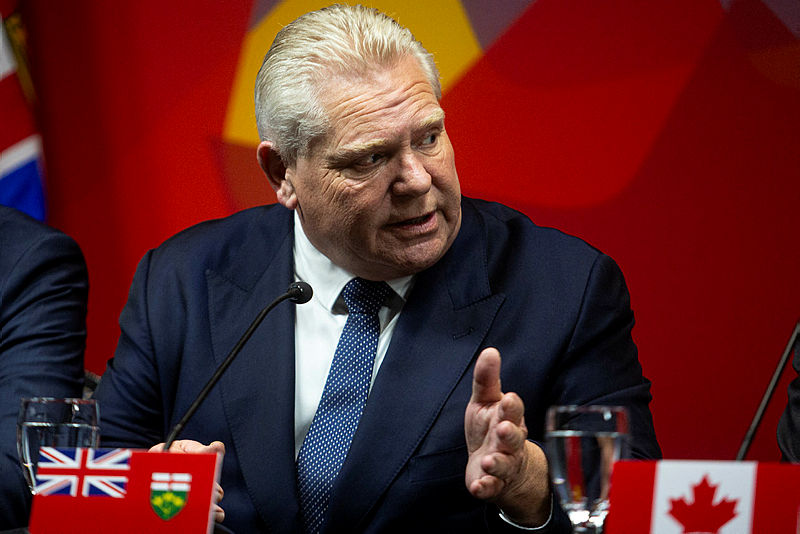Conservatives target labour vote as NDP support wanes, but union leader says there’s ‘no substance’ behind catchy slogans

The Conservatives have been courting what one strategist calls a “politically homeless” faction among unionized workers, with policy pledges and messaging to gain NDP voters as economic anxiety threatens to reshape Canada’s labour landscape.
But labour leaders argue that slogans can’t undo the Conservative record, and are unlikely to shift voters’ loyalties built over decades.
Conservative Leader Pierre Poilievre, who is seeking re-election in Carleton, Ont., launched his “More Boots, Less Suits” plan on March 21, which aims to boost training and employment for workers in the skilled trades. According to this plan, a future Conservative government would offer apprenticeship grants of up to $4,000, and fund training halls for skills development for up to 350,000 workers over five years.

“The people who build the homes are not able to buy them,” Poilievre said while addressing construction union members in Ottawa. “That’s why common-sense Conservatives will always stand with our employers and our unions.”
Speaking in New Brunswick last week, Poilievre announced plans to establish a national energy corridor to expedite key projects. In Winnipeg, Man., he pledged to expand tax deductions for tradespeople who travel for work.
His messaging was met with support from employer associations like the Coalition of Concerned Manufacturers and Businesses of Canada, and the Independent Contractors and Businesses Association. The International Brotherhood of Boilermakers, based in Kansas City, Mo., has shown support for Poilievre, while the Labourers’ International Union of North America and Canada’s Building Trades Unions positively highlighted elements of his plan, without a formal endorsement. Merit Canada, which represents non-union employers in the construction sector, has also endorsed the Conservative leader.
‘No substance’ to Poilievre’s promises to workers, says Bruske
Canadian Labour Congress (CLC) president Bea Bruske argued that the Conservatives—much like the Republicans in the United States—have been actively courting workers by claiming that their party stands up for labour issues. That has allowed them to grab attention from people struggling to earn a living, or juggling two or three different jobs in order to make ends meet, she said.

“People are frustrated. They’re worried about their jobs. And Pierre Poilievre—just like [U.S. President] Donald Trump—is very good at one-liners. But when you peel back the layers of what’s behind it, there’s no substance to it,” Bruske said.
While Poilievre’s training and apprenticeship policy promise is a good plan, according to Bruske, the Conservatives’ voting record does’t reflect the depth and breadth of their position.
“I would ask any unions that are endorsing Poilievre to take a really long, hard look at their policy book that’s renewed at every convention—that talks about stripping unions of their rights by bringing right-to-work legislation to Canada,” Bruske said.
In June 2024, the Poilievre-led Conservatives supported Bill C-58, also known as anti-scab legislation, which bans the use of replacement workers during strikes. Poilievre’s office said a future Conservative government would continue to support the ban.
But labour groups have criticized him for opposing pro-worker measures in the past. Bill C-58 passed only after Poilievre voted against the measure, an approach to anti-scab legislation he’s taken eight times in the past, according to the Canadian Union of Public Employees (CUPE). In 2023, the CLC accused the Conservatives of using procedural tactics to delay critical legislation designed to benefit workers. In 2014, Poilievre voted against a motion to reinstate the federal minimum wage and incrementally increase it to $15 per hour over five years.
In 2021, the Conservatives voted against the Canadian Sustainable Jobs Act, and that same year opted against NDP-sponsored private member’s bills for pharmacare and federal dental care. In 2022, the party voted against the government’s dental plan, which Poilievre has since suggested his government would “protect.” While the Tories voted in favour of the Early Learning and Child Care Act in 2023, they have previously opposed it. In 2024, Conservative MPs also opposed the government’s pharmacare legislation.
Bruske said endorsements play a critical role in guiding those who may not be deeply engaged in politics, and that workers trust their unions to negotiate the best possible conditions on their behalf—but, like anyone else, they will ultimately make their own decisions.
Labour voters ‘politically homeless’: strategist

Poilievre’s strategy to court the labour vote could help make inroads into traditionally NDP-held ridings where his party has been competitive, according to Conservative observers.
Yaroslav Baran, co-founder of communications firm Pendulum Group and a former Conservative staffer, argued that Tories at the federal and provincial levels have been “quite aggressively courting working Canadians” for some time now.
Former Conservative staffer Andrea Sarkic, who is now a public affairs counsellor for Compass Rose Group, explained that Poilievre’s courting of the labour vote is less about rebranding his party in the eyes of some unionized workers, and more about focusing the Conservative campaign narrative of “pocketbook” issues affecting a wider group of Canadians.
Sarkic said Conservatives’ “well-curated messages” are supported with “real policy proposals” concerning travel tax breaks for those working in trades, and boosting training and jobs for workers.
Baran argued that big business has increasingly aligned with the governing Liberals, while the NDP has drifted from its labour roots as the party became a coalition of labour, environmentalists, and progressive urban voters. He said the latter group came to dominate the party’s worldview, leaving many working-class Canadians “politically homeless.”
“Conservatives have seized upon that rather successfully. The traditional dividing line between the centre-right and the centre-left was, one could argue, unionized employees versus non-unionized employees. And I think that’s shifted,” Baran said.

The “we’re-going-to-fight-for-regular-people,” rhetoric which has become the tone of a new conservatism, according to Baran, has “definitely been identified as an integral part” of the Conservative campaign.
Tories have an edge in some union-heavy NDP-held ridings
Sarkic also said the 2021 election results reveal a pattern in several NDP-held ridings such northern Ontario’s Algoma-Manitoulin-Kapuskasing, and in Timmins-James Bay, as well as Elmwood-Transcona, Man., and Vancouver Island’s North Island-Powell River where the Conservatives finished second.
“The federal Conservatives are hoping that their common-sense message can also resonate with these workers in Ontario, as that is a key battleground for the Conservatives—especially if Quebec is off the table and firm for the Liberals,” Sarkic said.
Baran said union endorsements could translate into higher voter turnout, but it will ultimately come down to the policies that persuade voters to choose one party over another.
Larry Savage, a professor of labour studies at Brock University, argued that Poilievre is taking pages from Ontario Premier Doug Ford’s playbook, by “using union halls as backdrops for campaign stops, and actively courting union leaders in search of endorsements.”

Savage argued that the endorsement of unions like the Boilermakers shows that the Tories “have a foot in the door,” but Poilievre is “faltering.”
“When he was riding high in the polls, Poilievre anticipated picking up an unprecedented number of union endorsements over the course of the campaign. But now that [Prime Minister Mark] Carney has pulled ahead, some union leaders are getting cold feet and those endorsements may never materialize,” Savage explained.
According to Savage, Conservatives have very little to offer the labour movement, which makes them “far less attractive as a dance partner for the blue-collar male-dominated unions they’ve been courting.”
Savage said despite the increase in Conservative support particularly among construction unions, the NDP can still count on its strong historical, and ideological ties to the labour movement to secure wide-spread support from large groups such CUPE, United Steelworkers, and Amalgamated Transit Union.
McGrath: ‘Has [Poilievre] ever been on a picket line?‘
NDP national director Anne McGrath told The Hill Times on April 1 that she is “not surprised” by the Tories’ attempts to poach labour votes, and said they “may get some votes from those [unions that showed support for Poilievre].

But, she argued that her party’s message is still landing with labour voters, and the NDP is not necessarily positioning itself to protect any votes that may shift to the Tories.
“I wouldn’t exactly say that we’re positioning ourselves. The labour movement is us, and we are the labour movement.”
“We are with workers—not just as backdrops to an announcement, wearing hard hats. We are with workers on a daily basis, standing with them in their fight for fair wages, better working conditions, and more democracy,” McGrath said. “So you might see Poilievre going around to shop floors, but has he ever been on a picket line?”
When asked whether the new U.S. tariffs on Canada—expected to affect the manufacturing and labour sectors—could push some voters toward the Conservatives or Liberals, McGrath said she did not understand the basis of such an argument.
“Voters are going to be looking at parties to decide who they are going to support. Hopefully they’re going to look at where their policies are, what their history is, what their priorities are, what their values are, and that’s what we’re running on,” McGrath said.
Lavigne: Poilievre’s pledges just ‘cheap sloganeering’
Brad Lavigne, a partner at Counsel Public Affairs who served as the NDP’s national campaign director in 2011, argued that Poilievre’s promises to workers are just “cheap sloganeering that, at the end of the day, is relatively meaningless”.
“[Poilievre] had a taxpayer-paid pension since the age of 30. He’s probably never picked up a shovel or a blowtorch in his life, and yet he attempts to dine out on this notion that he—and he alone—understands what working men and women go through,” Lavigne said. “It’s incredibly rich for him and the Conservatives to suggest they stand for working men and women.”
Both McGrath and Lavigne challenged the assumption that the NDP has always secured all labour votes, but emphasized that the party’s identity remains firmly rooted in the labour movement.
“People have their own opinions on politics, and they vote for whoever. But broadly speaking, the NDP was formed out of the labour movement, and we have close, close ties with unions and with workers.”
ikoca@hilltimes.com
The Hill Times
CPC union endorsements
- International Brotherhood of Boilermakers
- United Association Local 67
NDP union endorsements
- Canadian Union of Public Employees
- Amalgamated Transit Union
- United Steelworkers
- Ontario Nurses’ Association
EDITOR’S NOTE: This article was updated on April 5 at 10:30 a.m. to correct that Canada’s Building Trades Unions have not endorsed the Conservative Party, as previously reported. The union is non-partisan has publicly recognized both Liberal and Conservative policies on workers. The Labourers’ International Union of North America has also not formally endorsed the Conservative Party, as was previously reported. The Hill Times regrets the error.






 LICENSING
LICENSING PODCAST
PODCAST ALERTS
ALERTS













